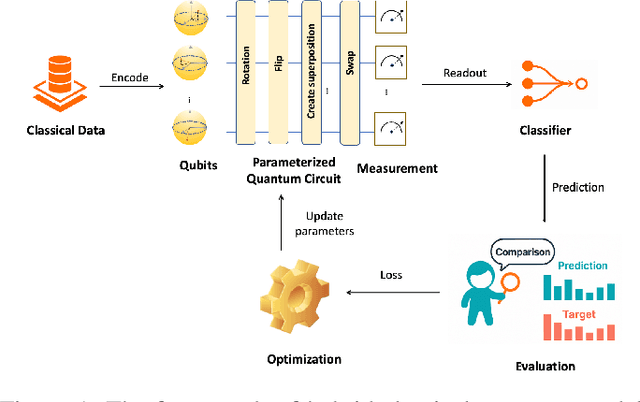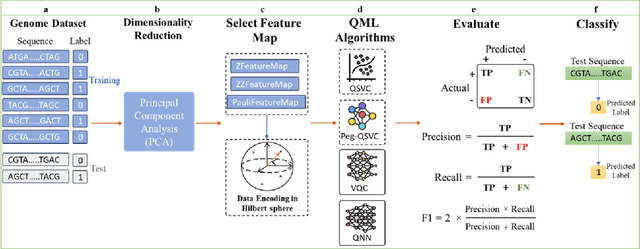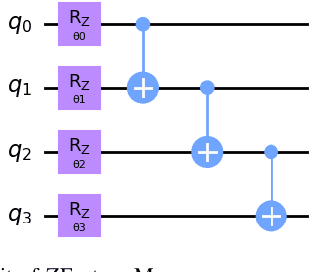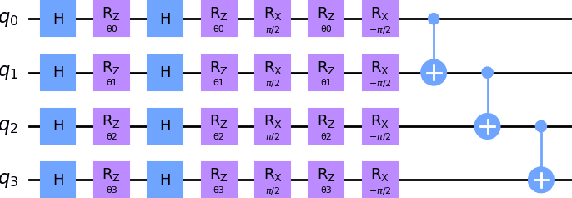Shiva Raj Pokhrel
Black-Box Auditing of Quantum Model: Lifted Differential Privacy with Quantum Canaries
Dec 16, 2025



Abstract:Quantum machine learning (QML) promises significant computational advantages, yet models trained on sensitive data risk memorizing individual records, creating serious privacy vulnerabilities. While Quantum Differential Privacy (QDP) mechanisms provide theoretical worst-case guarantees, they critically lack empirical verification tools for deployed models. We introduce the first black-box privacy auditing framework for QML based on Lifted Quantum Differential Privacy, leveraging quantum canaries (strategically offset-encoded quantum states) to detect memorization and precisely quantify privacy leakage during training. Our framework establishes a rigorous mathematical connection between canary offset and trace distance bounds, deriving empirical lower bounds on privacy budget consumption that bridge the critical gap between theoretical guarantees and practical privacy verification. Comprehensive evaluations across both simulated and physical quantum hardware demonstrate our framework's effectiveness in measuring actual privacy loss in QML models, enabling robust privacy verification in QML systems.
Communication Efficient Adaptive Model-Driven Quantum Federated Learning
Jun 05, 2025Abstract:Training with huge datasets and a large number of participating devices leads to bottlenecks in federated learning (FL). Furthermore, the challenges of heterogeneity between multiple FL clients affect the overall performance of the system. In a quantum federated learning (QFL) context, we address these three main challenges: i) training bottlenecks from massive datasets, ii) the involvement of a substantial number of devices, and iii) non-IID data distributions. We introduce a model-driven quantum federated learning algorithm (mdQFL) to tackle these challenges. Our proposed approach is efficient and adaptable to various factors, including different numbers of devices. To the best of our knowledge, it is the first to explore training and update personalization, as well as test generalization within a QFL setting, which can be applied to other FL scenarios. We evaluated the efficiency of the proposed mdQFL framework through extensive experiments under diverse non-IID data heterogeneity conditions using various datasets within the Qiskit environment. Our results demonstrate a nearly 50% decrease in total communication costs while maintaining or, in some cases, exceeding the accuracy of the final model and consistently improving local model training compared to the standard QFL baseline. Moreover, our experimental evaluation thoroughly explores the QFL and mdQFL algorithms, along with several influencing factors. In addition, we present a theoretical analysis to clarify the complexities of the proposed algorithm. The experimental code is available at 1.
LLM-QFL: Distilling Large Language Model for Quantum Federated Learning
May 24, 2025Abstract:Inspired by the power of large language models (LLMs), our research adapts them to quantum federated learning (QFL) to boost efficiency and performance. We propose a federated fine-tuning method that distills an LLM within QFL, allowing each client to locally adapt the model to its own data while preserving privacy and reducing unnecessary global updates. The fine-tuned LLM also acts as a reinforcement agent, optimizing QFL by adjusting optimizer steps, cutting down communication rounds, and intelligently selecting clients. Experiments show significant efficiency gains. We pioneer a synergy between LLM and QFL, offering: i) practical efficiency: Reduced communication costs and faster convergence. ii) theoretical rigor: Provable guarantees for adaptive federated optimization. iii) scalability: PEFT methods (LoRA, QLoRA) enable deployment on resource-constrained quantum devices. Code implementation is available here 1.
Distilling Large Language Models for Network Active Queue Management
Jan 28, 2025Abstract:The growing complexity of network traffic and demand for ultra-low latency communication require smarter packet traffic management. Existing Deep Learning-based queuing approaches struggle with dynamic network scenarios and demand high engineering effort. We propose AQM-LLM, distilling Large Language Models (LLMs) with few-shot learning, contextual understanding, and pattern recognition to improve Active Queue Management (AQM) [RFC 9330] with minimal manual effort. We consider a specific case where AQM is Low Latency, Low Loss, and Scalable Throughput (L4S) and our design of AQM-LLM builds on speculative decoding and reinforcement-based distilling of LLM by tackling congestion prevention in the L4S architecture using Explicit Congestion Notification (ECN) [RFC 9331] and periodic packet dropping. We develop a new open-source experimental platform by executing L4S-AQM on FreeBSD-14, providing interoperable modules to support LLM integration and facilitate IETF recognition through wider testing. Our extensive evaluations show L4S-LLM enhances queue management, prevents congestion, reduces latency, and boosts network performance, showcasing LLMs' adaptability and efficiency in uplifting AQM systems.
* 11 pages
Modeling Quantum Machine Learning for Genomic Data Analysis
Jan 14, 2025



Abstract:Quantum Machine Learning (QML) continues to evolve, unlocking new opportunities for diverse applications. In this study, we investigate and evaluate the applicability of QML models for binary classification of genome sequence data by employing various feature mapping techniques. We present an open-source, independent Qiskit-based implementation to conduct experiments on a benchmark genomic dataset. Our simulations reveal that the interplay between feature mapping techniques and QML algorithms significantly influences performance. Notably, the Pegasos Quantum Support Vector Classifier (Pegasos-QSVC) exhibits high sensitivity, particularly excelling in recall metrics, while Quantum Neural Networks (QNN) achieve the highest training accuracy across all feature maps. However, the pronounced variability in classifier performance, dependent on feature mapping, highlights the risk of overfitting to localized output distributions in certain scenarios. This work underscores the transformative potential of QML for genomic data classification while emphasizing the need for continued advancements to enhance the robustness and accuracy of these methodologies.
Modeling Feature Maps for Quantum Machine Learning
Jan 14, 2025Abstract:Quantum Machine Learning (QML) offers significant potential for complex tasks like genome sequence classification, but quantum noise on Noisy Intermediate-Scale Quantum (NISQ) devices poses practical challenges. This study systematically evaluates how various quantum noise models including dephasing, amplitude damping, depolarizing, thermal noise, bit-flip, and phase-flip affect key QML algorithms (QSVC, Peg-QSVC, QNN, VQC) and feature mapping techniques (ZFeatureMap, ZZFeatureMap, and PauliFeatureMap). Results indicate that QSVC is notably robust under noise, whereas Peg-QSVC and QNN are more sensitive, particularly to depolarizing and amplitude-damping noise. The PauliFeatureMap is especially vulnerable, highlighting difficulties in maintaining accurate classification under noisy conditions. These findings underscore the critical importance of feature map selection and noise mitigation strategies in optimizing QML for genomic classification, with promising implications for personalized medicine.
Robust Zero Trust Architecture: Joint Blockchain based Federated learning and Anomaly Detection based Framework
Jun 24, 2024Abstract:This paper introduces a robust zero-trust architecture (ZTA) tailored for the decentralized system that empowers efficient remote work and collaboration within IoT networks. Using blockchain-based federated learning principles, our proposed framework includes a robust aggregation mechanism designed to counteract malicious updates from compromised clients, enhancing the security of the global learning process. Moreover, secure and reliable trust computation is essential for remote work and collaboration. The robust ZTA framework integrates anomaly detection and trust computation, ensuring secure and reliable device collaboration in a decentralized fashion. We introduce an adaptive algorithm that dynamically adjusts to varying user contexts, using unsupervised clustering to detect novel anomalies, like zero-day attacks. To ensure a reliable and scalable trust computation, we develop an algorithm that dynamically adapts to varying user contexts by employing incremental anomaly detection and clustering techniques to identify and share local and global anomalies between nodes. Future directions include scalability improvements, Dirichlet process for advanced anomaly detection, privacy-preserving techniques, and the integration of post-quantum cryptographic methods to safeguard against emerging quantum threats.
Analysis, Modeling and Design of Personalized Digital Learning Environment
May 17, 2024Abstract:This research analyzes, models and develops a novel Digital Learning Environment (DLE) fortified by the innovative Private Learning Intelligence (PLI) framework. The proposed PLI framework leverages federated machine learning (FL) techniques to autonomously construct and continuously refine personalized learning models for individual learners, ensuring robust privacy protection. Our approach is pivotal in advancing DLE capabilities, empowering learners to actively participate in personalized real-time learning experiences. The integration of PLI within a DLE also streamlines instructional design and development demands for personalized teaching/learning. We seek ways to establish a foundation for the seamless integration of FL into learning systems, offering a transformative approach to personalized learning in digital environments. Our implementation details and code are made public.
An Independent Implementation of Quantum Machine Learning Algorithms in Qiskit for Genomic Data
May 16, 2024Abstract:In this paper, we explore the power of Quantum Machine Learning as we extend, implement and evaluate algorithms like Quantum Support Vector Classifier (QSVC), Pegasos-QSVC, Variational Quantum Circuits (VQC), and Quantum Neural Networks (QNN) in Qiskit with diverse feature mapping techniques for genomic sequence classification.
* 2 pager extended abstract
Quantum Federated Learning Experiments in the Cloud with Data Encoding
May 01, 2024Abstract:Quantum Federated Learning (QFL) is an emerging concept that aims to unfold federated learning (FL) over quantum networks, enabling collaborative quantum model training along with local data privacy. We explore the challenges of deploying QFL on cloud platforms, emphasizing quantum intricacies and platform limitations. The proposed data-encoding-driven QFL, with a proof of concept (GitHub Open Source) using genomic data sets on quantum simulators, shows promising results.
 Add to Chrome
Add to Chrome Add to Firefox
Add to Firefox Add to Edge
Add to Edge